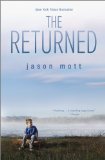Summary | Excerpt | Reading Guide | Reviews | Beyond the book | Read-Alikes | Genres & Themes | Author Bio

A Novel
by David J. HalperinI grew up surrounded by science fiction, the brightly colored spines of my father's extensive novel collection emblazoned with titles like Do Androids Dream of Electric Sheep?, Rendezvous with Rama, and The Mote in God's Eye. While I never warmed to the "hard" sci-fi that my dad favored (descriptions of the intricate workings of space stations and the barometric pressure of Pluto tend to make my eyes glaze over), I found myself drawn to the darker, more melancholy aspects of the genre, eventually succumbing to the spell of Ray Bradbury's stories and developing a taste for dystopian literature. Without this early immersion in the trappings of sci-fi, I may never have appreciated Margaret Atwood's Oryx and Crake, Michel Faber's Under the Skin, Angela Carter's The Infernal Desire Machines of Dr. Hoffman, or Neal Stephenson's Snow Crash. And I might have laughed if someone had told me that it was possible to write an enthralling and deeply sad meditation on adolescence and Judaism in the guise of a novel that includes futuristic spacecraft, bug-eyed aliens, and conspiracy theories, but Journal of a UFO Investigator is that book.
We meet narrator Danny in 1966 during his senior year of high school, but most of the journal's action takes place about four years earlier, during the heady days of the Cuban Missile Crisis and America's burgeoning cultural fascination with space. Fed on UFO sensationalist literature like Gray Barker's They Knew Too Much About Flying Saucers (the source of the "Men in Black" trope - see the sidebar for more about Gray Barker), Danny and his friend Jeff form a UFO Investigators Club and set out to write the definitive book on the subject, but when a girl comes between them, the friendship sours.
As the lone Jewish boy at his school, Danny subsequently embarks on an interior journey where he meets a trio of likeminded co-conspirators: the savvy and alluring Rochelle, her taciturn boyfriend Tom, and their Cheshire Cat-like leader, Julian. Under their aegis, Danny becomes involved in the notorious controversy surrounding an alleged alien crash landing in Roswell, New Mexico. Dodging the omnipresent Men in Black, who appear throughout the novel in a variety of guises - often as a kind of sinister take on the biblical Three Magi - Danny pilots a saucer to an isolated planet. Fighting to survive in this dry, ashen landscape, our hero undergoes a remarkable transformation that not only prepares him for the challenges he faces as an earthbound teenager but also for the roles that he will eventually play as a man: lover, father, scholar, and chronicler of family history.
Halperin makes the wise decision not to dwell on how much of the narrative takes place in Danny's notebook and how much takes place in his "real" life, trusting the reader to see parallels between the two and make inferences. The boy whose mother is too ill to plan his bar mitzvah instead creates his own initiation into manhood via a journey through the cosmos. Yet the novel eschews easy answers or a false sense of triumph, ending with a series of scenes that acknowledge the profundity of Danny's alienation and, indeed, that illustrate the aptness of science fiction as a metaphor for this concept.
At the end of the section entitled "Moonlight Bay," as Danny escapes the barren planet, he reflects: "Somewhere in the blackness ahead of me, I knew, there was a slit wide enough for me to pass through. In the massed fabric of reality there's always a slit. You must find it...Miss it, and you wander in darkness and endless thirst." Journal of a UFO Investigator explores what happens on both sides of that massed fabric and suggests that the gap between darkness and light might not be as wide as we would like to believe.
![]() This review
first ran in the March 24, 2011
issue of BookBrowse Recommends.
This review
first ran in the March 24, 2011
issue of BookBrowse Recommends.

If you liked Journal of a UFO Investigator, try these:

by Charles Burns
Published 2024
The beloved and award-winning author of Black Hole's haunting and visually arresting story of an artist's obsessions, and the value and cost of pushing the boundaries of creativity.

by Jason Mott
Published 2014
In a spellbinding and stunning debut, award-winning poet Jason Mott explores timeless questions of faith and morality, love and responsibility.
Your guide toexceptional books
BookBrowse seeks out and recommends the best in contemporary fiction and nonfiction—books that not only engage and entertain but also deepen our understanding of ourselves and the world around us.